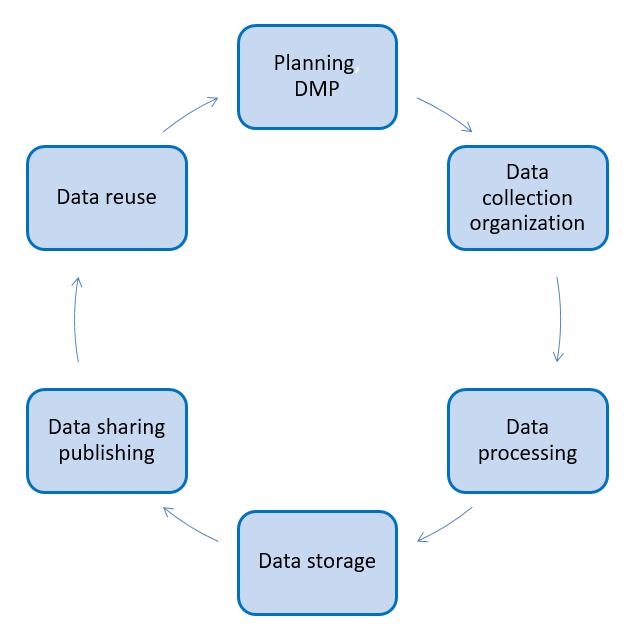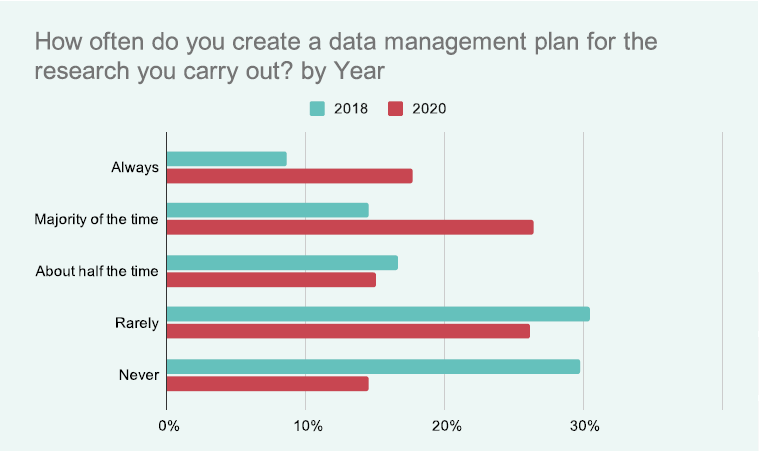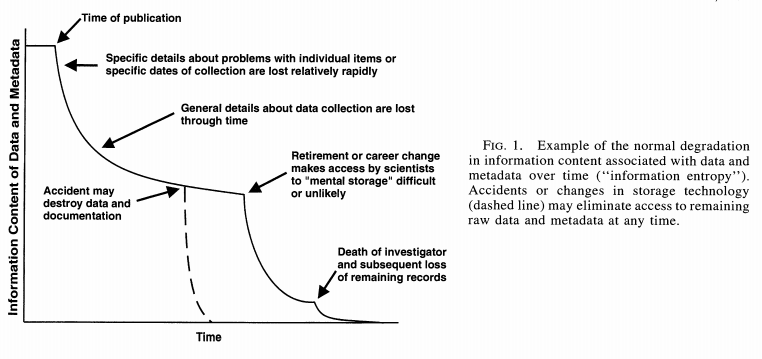Research Data Management and Publishing
Data Management Plan
Data management refers to all data-related activities which ensure the high quality of research data, such as organising, documenting, storing and archiving of data, which allow access to and re-use of data.
Data management plan (DMP) is an official document which describes how research data are managed during and after the completion of a research project.
Research Data Lifecycle
We can say that data management is a set of activities initiated by the data policy with the aim of carrying the data safely through its “life cycle” as displayed below.

This simple chart visualises all important stages of research data management and facilitates a systematic approach to data management. Each stage consists of a number of specific activities, which should be planned and written down before starting the research.
We could ask, why this is called the life cycle of research data because, in fact, exactly the same activities as during the original research are not any more repeated with the same data. However, the next key term is “reusing”. The already published data can be used in follow-up studies or in some other research by other scientists.
The life cycle of data is, essentially, a series or a circle of logical activities, not a chart of data flow.
Here, the data management stages during the whole course of research are expressed linearly, stressing the importance of documenting the data, methods and processes, quality control and data protection during the whole cycle. Such chart can also specify the starting point of the cycle more precisely.

Faundeen, J.L., Burley, T.E., Carlino, J.A., Govoni, D.L., Henkel, H.S., Holl, S.L., Hutchison, V.B., Martín, Elizabeth, Montgomery, E.T., Ladino, C.C., Tessler, Steven, and Zolly, L.S., 2013, The United States Geological Survey Science Data Lifecycle Model: U.S. Geological Survey Open-File Report 2013–1265, 4 p., http://dx.doi.org/10.3133/ofr20131265
Data management plan as a roadmap
Research project can usually take a few years to complete. Project management and reporting can be easier if the project is well designed, its budget and labour needs well planned and all important steps and stages well documented.
Data management plan is of great help here. The plan can be changed and improved during the progress of the project, making sure that all the participants knew what will be done with the data during the project and after its end, and who will be responsible for different stages of the plan.
Increasing numbers of funders around the world are mandating researchers to submit a DMP with their grant application.

Science, Digital; Hahnel, Mark; McIntosh Borrelli, Leslie; Hyndman, Alan; Baynes, Grace; Crosas, Merce; et al. (2020): The State of Open Data 2020. Digital Science. Report. https://doi.org/10.6084/m9.figshare.13227875.v2
This chart, published in 1997, points out the reasons and timeline of the loss of information. We can see that data management needs special attention after the end of the project and the publication of articles because, due to several objective and subjective reasons, the data may later be not accessible or understandable any more.

Michener et al. (1997 William K. Michener , James W. Brunt , John J. Helly , Thomas B. Kirchner and Susan G. Stafford , `Nongeospatial Metadata for the Ecological Sciences’, Ecological Applications 7/1 (February): 330-342.
Drawing up and following a data management plan is especially important for doctoral students, because by the time they will submit their theses, the publishing of underlying data of the research has certainly become the norm.
When starting a research, it is advisable to define the relevant data policy, especially when there will be partners from universities of other countries, where the official data policy has already been adopted.
DMPonline – a tool for creating Data Management Plan
Digital Curation Centre in Great Britain has developed a special software for drawing up data management plans, which can be used by all and tailored to meet specific needs.
DMPonline instructions are quite general and do not take into consideration different fields of research which is why Science Europe has been working on evolving data management plan standards, so-called disciplinary research data management protocols, Domain Data Protocols (DDPs).
Evaluation of DMP-s
The first evaluators of a DMP are the researchers themselves. Is it a co-authored document that they will benefit from or is it solely a document for submission to bureaucrats.
The DMP-s that accompany grant applications are evaluated mostly by subject experts, but they usually follow some formal guidelines.
Additional reading: Science Europe’s Practical Guide to the International Alignment of Research Data Management offers targeted guidance for organisations, disciplines, and individual researchers. Originally released in 2019 and updated in January 2021 to include guidance to support the evaluation of data management plans. The guide presents core requirements for DMPs and an evaluation rubric. se_rdm_practical_guide_extended_final.pdf


